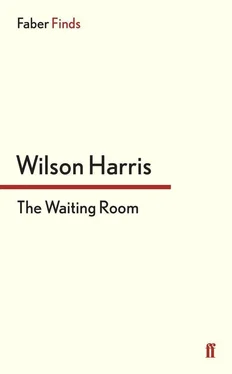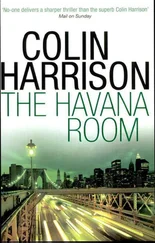Wilson Harris - The Waiting Room
Здесь есть возможность читать онлайн «Wilson Harris - The Waiting Room» весь текст электронной книги совершенно бесплатно (целиком полную версию без сокращений). В некоторых случаях можно слушать аудио, скачать через торрент в формате fb2 и присутствует краткое содержание. Год выпуска: 2012, Издательство: Faber Finds, Жанр: Современная проза, на английском языке. Описание произведения, (предисловие) а так же отзывы посетителей доступны на портале библиотеки ЛибКат.
- Название:The Waiting Room
- Автор:
- Издательство:Faber Finds
- Жанр:
- Год:2012
- ISBN:нет данных
- Рейтинг книги:4 / 5. Голосов: 1
-
Избранное:Добавить в избранное
- Отзывы:
-
Ваша оценка:
- 80
- 1
- 2
- 3
- 4
- 5
The Waiting Room: краткое содержание, описание и аннотация
Предлагаем к чтению аннотацию, описание, краткое содержание или предисловие (зависит от того, что написал сам автор книги «The Waiting Room»). Если вы не нашли необходимую информацию о книге — напишите в комментариях, мы постараемся отыскать её.
The Waiting Room — читать онлайн бесплатно полную книгу (весь текст) целиком
Ниже представлен текст книги, разбитый по страницам. Система сохранения места последней прочитанной страницы, позволяет с удобством читать онлайн бесплатно книгу «The Waiting Room», без необходимости каждый раз заново искать на чём Вы остановились. Поставьте закладку, и сможете в любой момент перейти на страницу, на которой закончили чтение.
Интервал:
Закладка:
How could she begin to accept and relinquish at the same time a conception of appearances she had come to believe she had once and truly adopted and loved, long, long ago, and whose stature of repudiation (or flight from her) she found equally diminishing in preconceived matter or content as nourishing in unconditional unity — being and spirit?
And indeed which cubit was less real (or more concrete) than the other? Might not her proud flesh-and-blood, her illusion of strength, prove so adamant it became equally worthless?
It was the first baffling sentence “he” had written in the log-book — baffling because as she traced it from memory she found herself both banished and reclaimed within an intimate structure of relationship….
She began to trace the narrative title upon a further page of the log-book — THIEF. THIEF, but found herself now, unwittingly perhaps, half-erasing, half-converting this — with every stroke of a vacant finger — into the shadow of another continuous vigil WATCHMAN. WATCHMAN…. The borderline features which she summoned, part-veiled, part-exposed, were half-subject, half-object of each other — displaced by each other within “living” room, “waiting” room, equally substantial as frail, animate as inanimate within a yielding train of capacity that erected “objective” goals, “subjective” barriers, whose “inner” openness or “outer” obduracy of conviction was but one involuntary spectre.
Thief. Thief. WATCHMAN. WATCHMAN. The telephone in the room began to ring. Her husband was calling to say he would be half an hour late. Was there anything she would like him to get her?
Nothing. Her voice and reply seemed perfectly normal and self-possessed in her own ears. But in his, at the other end, came a sharp note, rebuke, accusation…. What was she accusing him of …? It was not the first time he felt this. Was he robbing her, depriving her (within the very care and attention he lavished upon her) of something she desperately needed? Was it a bond of friction he cultivated and she resented?
Was he over-exacting, over-scrupulous, too solicitous — unchanging, identical in compulsion and manner? Was he pushing her to the brink of exhaustion?
The helplessness of his situation began to assume the sharpest and yet most arid proportions. Was there nothing, after all, he could do for her? Susan hesitated with a curious sensation of crumbling within his ultimatum and ring of light.
She knew she was beginning to slip, in spite of his every precaution, into a depth of self-knowledge, a depth of isolation from which he guarded her. But who was he, after all, to guard her in one thing and confess himself ignorant and fearful of relative desolation in another? How did “he” see her in the ultimate corruption of flesh at the ghostly end of the line upon which she seemed to pull both close at hand and yet utterly removed? Could he husband within himself a distant and faint spiritual body of resources while bending himself upon it with all the material strength at his command, to exorcise the very fiend of estrangement and love?
Tension of the “dead” in the living, and of the “living” in the dead, as a consequence of which there glided a shadow of complexity (Susan knew), an intangible cloud or fiction, rain and drought. The line suddenly went “dead” in her hands. Merely the sputter of space now. The gibberish of the stars. The naïveté of eternity. “His” true gift perhaps in the end. Nothing. Instantaneous unpredictable relief within every “given” body of terror in flight from unnatural fears and responsibilities…. Thief. Thief. WATCHMAN. WATCHMAN.
She replaced the receiver upon the hook. Abruptly (like someone anticipating another ring), for even as the replacement provided her with the old insensible order and crew, “deaf” monument, attention, she was aware once again how it stripped her of something she had refused but entirely wanted to grasp … accept … as hers by truth whose shadow still moved over or against her.
*
The sea of traffic in the street suddenly appeared to rise and she felt a faint dry wave or shudder strike the wreck of the room: a blow not unlike the sound of her own fist dislodging itself from its shadow pressing into the eye of each finger-tip. Rolling “log”-book. Stranded telephone within the dust of memory. Toppling skull, ornamental ear and mouthpiece. Half-trailing, half-knotted signal and line. Watchman. THIEF.
Nothing moved. It was the strangest discordant flight of consequences she experienced — agitated body (vacant structure), nerve-end, string (bodiless splinter), tautness of sail stiff as a comb upon whose giant brow nothing moved as if “nothing” were “something”. So obscure this shift or severance was it seemed little more than the prick of an eye-tooth, the pressure of a finger-nail upon the palm of one hand. Nothing still moved —a faint shadow perhaps against the banality and monument of solipsis: phantom erection and ejection of parts issuing from the solid tyranny of proportion to swing into new clockwise mouth and head, anti-clockwise defiant trunk and limb.
“He” addressed her from within his new spiral — oracle and orbit, buoyant vessel, hieroglyph of space — declaring art is the phenomenon of freedom. “His” voice and their “log” book rang and struck her ears like a song. The “deaf” within her stirred and listened. The “dumb” she cherished began to speak. Susan started, grasped crew and ally she had thought — in a moment of acute self-knowledge and deprivation — to smash upon the floor. The dry-rot features of the past broke into fertile drum or ear, living mouth or tongue— What does one mean by phenomenon? they cried.
“They” had hardly uttered the words through “her”, when “he” responded by summoning “them” to make an inventory of the broken pieces, skin as well as wood, flung amidst the shattered telephone wires distended upon the floor. He had gone to great pains and expense, she recalled, to assemble these — and it seemed now, in the end, a sovereign principle that they should appear to endure and incorporate her features with each “dead” figure of the past which swung into new account and life.
“What do I mean by phenomenon? The hole in the monument, that’s what I mean.” He paused. She waited, tense. He could be so shattering, so severe. “There’s an ungraspable scale to nature and appearance. Remember that when you come to tackle the mess we’ve made of our economic affairs. In fact it was always beyond our control, even when the whole collection we’d scraped together seemed most obedient in relays of supply and demand.”
She was stung by the memory of crises they had suffered, some of which he had precipitated by temperamental recklessness. “But I don’t see ,” she cried. “I don’t understand why you profess to care at one moment — and still say in the same breath it doesn’t matter at all. Are you saying that there are hidden forces …?” She was lost. She listened for the lightning rustle of vessel and “log”-book. But his or their reply was harsh as stone, “no. I never said that.”
“What then?” she pleaded.
“Appearances cannot be grasped in their entirety. That’s all I said. Not a word about hidden forces. Let me put it this way — every commission of fact involves an omission of intensity.” He paused. She waited. “Let me put it in still another way— execute something, quite naturally or unnaturally, as one imagines, isolate something in order to examine it properly, as one thinks, and one arrests — or appears to arrest — a web of processes. There’s always this “negative” race with or against something in which one is involved from beginning to end and all the way back again. And one can never keep dead in step. A little bit ahead, who knows (even this clairvoyant leap one may appear to accomplish), or a little bit behind. But never dead in step. Every apparent execution of the swift runner of life involves a loss in true pace and intensity or flight, even if it seems but a shade this way or that. And it is this fluid distinction which turns ultimately into the annihilation of forced premises. Herein lies an explosive and incalculable web upon which and out of which emerges the “equal” stride and fiction of reality.”
Читать дальшеИнтервал:
Закладка:
Похожие книги на «The Waiting Room»
Представляем Вашему вниманию похожие книги на «The Waiting Room» списком для выбора. Мы отобрали схожую по названию и смыслу литературу в надежде предоставить читателям больше вариантов отыскать новые, интересные, ещё непрочитанные произведения.
Обсуждение, отзывы о книге «The Waiting Room» и просто собственные мнения читателей. Оставьте ваши комментарии, напишите, что Вы думаете о произведении, его смысле или главных героях. Укажите что конкретно понравилось, а что нет, и почему Вы так считаете.












